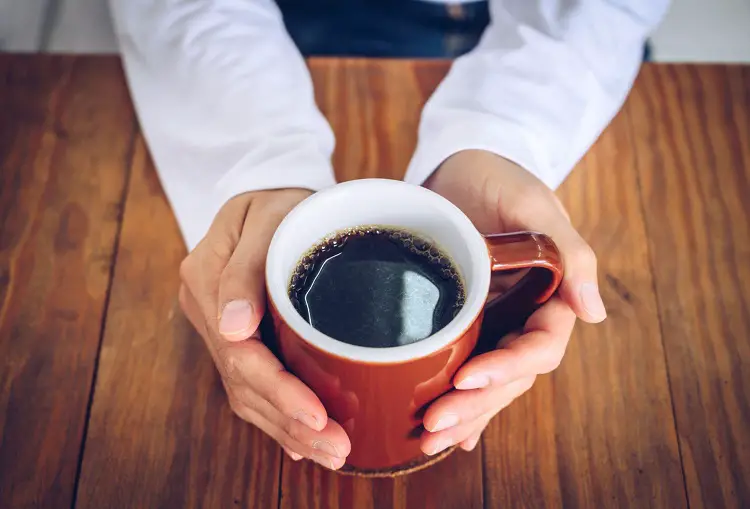If you’re a fan of iced tea, you’d admit that there’s an addictive taste you have from sipping a glass of the drink.
It is not mainly the sweet taste but a feeling of short-lived euphoria. Many coke lovers also feel this way whenever they drink a can of coke.
This feeling could be the presence of caffeine in both drinks.
Although each has varying amounts of caffeine, you can only be sure which contains more once you compare how much caffeine is in iced tea vs coke.
On average, a standard can of coke contains 35 mg of caffeine, while a cup of tea contains 27 mg of caffeine. However, teas (iced or hot) are made from different tea leaves; therefore, the amount of caffeine in a cup (250ml) depends on the tea leaves used and the brewing time.
This article discusses everything you need to know about iced tea and coke. Read on
Table of Contents
- What is Iced Tea Made Of?
- What is Coke Made Of?
- How Much Caffeine is in Iced Tea vs Coke?
- Iced Tea vs Coke – Nutritional Comparison
- Conclusion
What is Iced Tea Made Of?
In 1904, modifications to carbonated drinks led to the creation of iced tea.
Other ingredients were added to carbonated drinks during manufacturing to introduce different flavors.
Formerly, many iced teas contained sugars, colas, water, caramel color, phosphoric acid, carbon dioxide, caffeine, and some cocaine from the cola extracts.
These days, manufacturers have removed cocaine from the list of ingredients leaving only sugar, tea extracts, water, flavors, juices, acidity regulators, antioxidants, and caffeine.
Sugar serves as a common sweetener in most carbonated drinks.
However, consuming too much sugar in these drinks during pregnancy or breastfeeding may increase the risk of gestational diabetes and obesity. It could also cause problems with cognitive development and learning in babies.
Also, caffeine can be intoxicating, leading the European government to set standard caffeine limits for carbonated drinks.
The standard caffeine levels range from 150ml·¹ as an additional flavor, between 20 to 60mg for a 200ml cup of soft drink, 88 to 171mgl·¹ for regular cola drinks, and 81 to 124 mgl·¹ for diet cola drinks.
What is Coke Made Of?
Coke may seem like an all-time favorite soft drink for many people. The chance of you not having at least two coke lovers in a family of 10 is slim.
Not only is it sweet and soothing, but it also gives an addictive euphoric feeling that many people love to feel repetitive.
As good as it tastes, you’d be surprised to realize that about 90% of coke is carbonated water and nothing extra. This forms the base of the entire drink.
Other ingredients like sugar, caramel color, phosphoric acid, caffeine, and different natural flavors are mixed to form the sweet taste of the drink.
But as mentioned earlier, excessive sugar is harmful. Therefore, more than improving the taste, the caffeine’s slightly bitter taste counters the sugar’s effect.
Except for zero sugar or Diet coke, sugar is the primary sweetener for other cola drinks.
The caramel color used in coke is unique and specially formulated for coke alone to give it its signature color.
How Much Caffeine is in Iced Tea vs Coke?

Apart from the common minerals and vitamins you find in iced tea and coke, just as in other drinks, these two share a common ingredient that makes them stand out; both drinks contain caffeine in varying amounts.
Even though the European Government set a standard amount of caffeine for carbonated drinks, each drink has its unique quantity of caffeine in one serving.
On average, a standard can of coke contains 35 mg of caffeine, while a cup of tea contains 27 mg of caffeine.
However, teas (iced or hot) are made from different tea leaves. Therefore, the amount of caffeine in a cup of tea (250ml) depends on the type of tea leaves used and the brewing time.
Caffeine has been generally associated with coffee and soda. Few tea drinkers know that their teas contain caffeine, so replacing soda with tea isn’t the best choice if you’re trying to avoid caffeine.
The difference is how much caffeine is in each of these drinks.
While soda may be a general name for all carbonated drinks, there are different types of carbonated drinks with varying ingredients.
Therefore the amount of caffeine in them also varies. But since sodas are made with proportions, one can of soda contains the same amount of caffeine in a can of the same type of soda.
This cannot be said for teas since different teas are made differently and brewed differently.
Even though a cup of tea may share the same mineral content as a can of coke, one notable difference is how less caffeinated it is when compared to coke.
However, strongly brewed tea may contain as much caffeine as highly caffeinated energy drinks.
For instance, black tea contains about 40-70mg of caffeine in an 8 oz cup. Just as a can of mountain dew contains 54 mg of caffeine per 12 oz.
For better understanding, here is a breakdown of the caffeine content in some of the most commonly-found teas and sodas per serving.
| Teas | Caffeine Content |
| Black tea | 40-80mg |
| Green tea | 35-40mg |
| Oolong tea | 37-55mg |
| White tea | 15-30mg |
| Pu-erh Tea | 60-80mg |
| Sodas | Caffeine content |
| Diet Coke | 30.4mg |
| Pepsi One | 38mg |
| Dr. Pepper | 27mg |
| Sunkist | 19mg |
| Mountain dew | 54mg |
| Coca-Cola Zero | 35mg |
| Coca-Cola Classic | 34mg |
| Wild Cherry Pepsi | 38mg |
| Mr. Pibb | 40mg |
| Sunkist Orange | 42mg |
| Mello Yello | 35mg |
| Diet Pepsi | 36mg |
Some caffeine-free sodas are Sprite, 7-Up, ginger ales, and other fruit-flavored beverages (12-ounce cans and bottles). If you order them at a restaurant and get refills, remember that they might contain more caffeine than listed.
Read Also: Can I Drink Thai Iced Tea While Pregnant?
Iced Tea vs Coke – Nutritional Comparison
People have different preferences regarding what drinks work for them more, depending on their reason for taking them.
Naturally, coke is an energy-packed drink, all thanks to its sugar. Its high-calorie content makes it suitable for rejuvenation when your energy level is low.
Iced tea, on the other hand, is an excellent substitute for anyone looking for low-caffeine carbonated drinks. It equally contains high-calorie levels but not as much as coke does.
However, these are only some of the mineral and vitamin contents of both drinks that make them desirable.
Looking at the mineral and vitamin tables for both drinks gives a hint of how similar and different they are;
Mineral Contents of Iced Tea vs Coke
| Minerals | Iced Tea | Coke |
| Calcium | 1% | 1% |
| Potassium | 2% | 1% |
| Phosphorus | 16% | 5% |
| Zinc | 2% | 1% |
| Iron | 0% | 5% |
| Copper | 3% | 1% |
| Magnesium | 1% | 0% |
Vitamin Contents of Iced Tea vs Coke
| Vitamin | Iced Tea | Coke |
| B1 | 0% | 0% |
| B2 | 0% | 0% |
| B3 | 0% | 0% |
| B5 | 0% | 0% |
| B6 | 0% | 0% |
| Folate | 0% | 0% |
| B12 | 0% | 0% |
| K | 0% | 0% |
| A | 0% | 0% |
| E | 0% | 0% |
| D | 0% | 0% |
| C | 0% | 0% |
Conclusive Comparison of Nutrients Between Iced Tea vs Coke
| Nutrients | Iced Tea | Coke |
| Net Carbs | 9.09g | 9.56g |
| Fat | 0g | 0.02g |
| Protein | 0g | 0.07g |
| Calories | 36kcal | 37kcal |
| Sugar | 9.09g | 8.97g |
| Fiber | 0g | 0g |
Related Posts:
- Lipton tea during pregnancy – Is It Safe?
- Can I drink winter melon tea while pregnant?
- Can I drink lemon balm tea during pregnancy?
- Drinking caffeine while breastfeeding – is it safe & how much to drink?
Conclusion
I hope this article has given an in-depth discussion to answer your question about how much caffeine is in iced tea vs coke.
You can only tell how much caffeine is in a particular cup of tea (iced or cold) if you know what type of leaves it is or the brewing time.
Many teas come in packs with caffeine content written on it, which makes it easier to tell.
